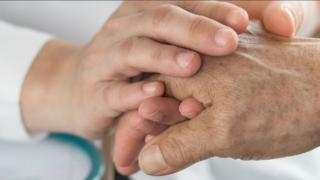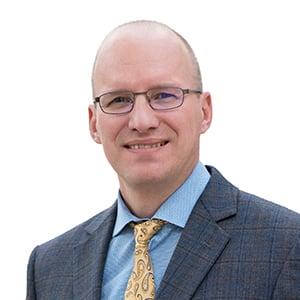“Mary,” a City of Hope patient and a 70-something grandmother from Beverly Hills, worries that the coronavirus and the calls to practice social distancing may actually make things worse for many seniors who already lack the close personal connections they desperately need.
“I just wish that people would not think that older people are invisible or incompetent,” she said. “I think that many of us seniors are very isolated and lonesome.”
“Eleanor,” another patient in her 80s, lives a few miles away. She feels the same, with an added concern: quickly getting up to speed on the latest technology.
“I am trying to stay positive and be kind. Not to say that it always works for me,” she lamented “I had a real meltdown last week, prompted by my frustrations with the computer, the new reliance on Zoom and other sites that I find difficult to deal with.”
As we all adapt to the new normal of sheltering in place and keeping our distance, experts say older Americans need extra care and vigilance, not only for medical reasons but for emotional ones, too. People over 60 have diminished immune systems, putting them at greater risk of contracting COVID-19 and suffering more if they do. Many seniors may also have underlying health conditions — such as cancer, diabetes or cardiovascular disease — that can make a bout with this virus more dangerous.
But it’s the risk to seniors’ mental and emotional well-being that most concerns William Dale, M.D., Ph.D., director of City of Hope’s Center for Cancer and Aging and the Arthur M. Coppola Family Chair in Supportive Care Medicine. It’s also why he dislikes the term “social distancing.”
“Those two words should never be together,” he said. “The key is physical distancing. You mustn’t stop being social. We need to maintain emotional connections even if we can’t be physically close, because isolation can be a terrible thing, leading to depression and cutting folks off from the help they need.”
Dale wants to see all people — young and old — increase their connections to one another, taking advantage of available technology, matching it to each person’s capabilities. Not every older adult can figure out a Zoom video conference, for example, but there’s no reason not to pick up the phone and talk to them, or send an email. To reach the unsavvy, anti-tech types, Dale recommends a secret weapon.
“Use the grandkids!” he said. “Ask them to check in” with grandma and grandpa, and watch what happens. “The grandparents will be motivated to learn the new technology to stay connected with the kids.”
And whenever possible, find ways to maintain face-to-face interaction. Perhaps hugs and kisses can’t happen right now, but seeing friends and loved ones from 6 feet away and with other proper precautions can still mean a lot.
“Mary” and her family have figured this out.
“When one grandchild came home [from an overseas trip], she stood on the sidewalk and we were on the porch so we could share love and throw kisses,” she said.
And “Eleanor” makes a point of reaching out.
“We must dig into ourselves and find more love to give away, especially at this time,” she said, “So I decided to give gifts to someone twice a week, like a delivery of pizza or fruit, and to send at least two emails or phone calls every day to friends.”
Importance of connection
Dale knows from personal experience — as a young resident at a VA hospital and in his current City of Hope job — the importance of personal contact. He remembers how disappointed some of his outpatient older veterans would be when he’d tell them, “You’re doing OK, no need to come in this week.”
“I was stunned,” he recalled, by the way they’d argue, ‘But I do need to see you! I need to talk to you!’
“It took me a while to recognize just how important it was to them to make a regular connection.”
He encounters similar challenges as City of Hope attempts to balance the infection risks of close contact with the emotional needs of each individual patient. Who should come in? Who can be better served with a telemedicine session? Who should get a home visit by a nurse? The staff uses a special assessment to help make those decisions, analyzing each patient’s unique needs and vulnerabilities, including the strength of their social networks and support systems.
Dale feels a heightened sense of responsibility now, in the face of this crisis, more determined than ever to do the right, meaningful thing for each patient. He hopes the day never comes when care is narrowly “triaged,” with seniors’ chronological age and physical condition placing them at the back of the line. “Disadvantages must never become a reason or excuse to further disadvantage people,” he said.
Do these three things
He’s urging every older person to do three things, right now:
“First,” he counseled, “if you do go out, remember that physical distance. Second, find ways to remain emotionally connected to friends and family. Don’t be afraid to reach out. Don’t worry about ‘bothering’ them. They want to hear from you. And third, identify what brings you peace in these anxious times — walking, meditation, whatever works for you.”
He has another list for young people with elders in their lives.
“Give a call, check in, make a visit, not in an infantilizing way, but in a ‘Hey, how you doin'?’ way. Reminisce with them. Sharing happy memories goes a very long way. And if you haven’t already, run through their medical scenarios. Do they have all the medications they need? Enough food? Their doctors’ phone numbers? Make sure.”
One last thing. Dale wants all of us to carefully think about our actions, because they will matter for a long time.
“Let’s have a sense of the moment,” he advised. “This is a historic event.
“How will we feel, six months from now, based on what we do today?”

